Somalia
A man in a donkey cart comes wheeling through the dust, carrying two small, silent boys. The sky is overcast. It could rain. It won't. It hasn't been for a very long time.
Mohamed Ahmed Diriye is 60 years old, and he's completing the grimmest journey of his life. He set off from a seaside city on the northern edge of Somalia two weeks ago.
Livestock were dying. He decided to abandon work as a day laborer and flee to the other end of the country, crossing a landscape of carcasses and Islamic extremist-held territory along the way.
Seven hundred miles later, he is exhausted. The food has run out. He clutches a battered stick in one hand, the nearly empty cart in the other. His boys are just 4 and 5.
They had tried to escape, Diriye says. "But we came across the same drought here."
More than 1 million Somalis have fled and discovered that, too.
In Somalia, a nation of poets, droughts are named for the kind of pain they bring. There was Prolonged in the 1970s, Cattle Killer in the 1980s, and Equal five years ago for its reach across the country. A decade ago, there was Famine, which killed a quarter-million people.
Somalis say the current drought is worse than any they can remember.
This drought has astonished resilient herders and farmers by lasting four failed rainy seasons, starting two years ago. The fifth season is underway and likely will fail too, along with the sixth early next year.
A rare famine declaration could be made as soon as this month. Thousands of people have died, including nearly 900 children under 5 being treated for malnutrition, according to United Nations data. The U.N. says half a million such children are at risk of death.
They include climate change, with some of the harshest effects of warming felt in Africa. Russia's invasion of Ukraine stalled ships carrying enough grain to feed hundreds of millions of people. A drop in humanitarian donations, as the world shifted focus to the war in Ukraine.
The Associated Press spoke with a dozen people in rapidly growing displacement camps during a visit to southern Somalia in late September. All say they've received little or no aid. A day's meal might be plain rice or just black tea.
Many camp residents, overwhelmingly women, and children beg from neighbours, or sleep on an empty stomach.
Mothers walk for days or weeks through bare landscapes in search of help, at times finding that the withered, feverish child strapped to them has died along the way.
"We'd grieve, stop for a while, pray," Adego Abdinur says. "We'd bury them beside the road."
She holds her naked 1-year-old in front of her new home, a fragile hut of plastic sacks and fabric lashed together with cord and stripped branches. It's one of the hundreds scattered over the dry land.
Behind a thorn barrier marking her hut from another, giggling children pour cherished water from a plastic jug into their hands, sipping and spitting in delight.
The home the 28-year-old Abdinur left was far superior — a farm of maize and dozens of livestock in the community where she was born and raised. The family was self-sufficient. Then the water dried up, and their four-legged wealth began to die.
"When we lost the last goat, we realized there was no way to survive," Abdinur says. She and her six children walked 300 kilometers (186 miles) here, following rumors of assistance along with thousands of other people on the move.
"We have seen so many children dying because of hunger," she says.
At the heart of this crisis, in areas where famine likely will be declared, is an Islamic extremist group linked to al-Qaida.
An estimated 740,000 of the drought's most desperate people live in areas under the control of the al-Shabab extremists. To survive, they must escape.
Al-Shabab's grip on large parts of southern and central Somalia was a major contributor to deaths in the 2011 famine. Much aid wasn't let into its areas, and many starving people weren't let out.
Somalia's president, who has survived three al-Shabab attempts on his life, has described the group as "mafia shrouded with Islam." But his government has urged it to have mercy now.
In a surprise comment on the drought in late September, al-Shabab called it a test from Allah, "a result of our sins and wrongdoings." Spokesman Ali Mohamud Rage claimed that the extremists had offered food, water and free medical treatment to more than 47,000 drought-affected people since last year.
However, in rare accounts of life inside al-Shabab-held areas, several people who fled told the AP they had seen no such aid.
Instead, they said, the extremists continue their harsh taxation of families' crops and livestock even as they withered and died.
One woman says al-Shabab taxed up to 50% of her family's meager harvest: "They don't care whether people are left with anything."
Some flee their communities at night to escape the fighters' attention, with men and even young boys often being forbidden to leave.
One woman says no one from her community was allowed to leave, and people who received assistance from the outside would be attacked.
Weeks ago, she says, al-Shabab killed a relative who had managed to take a sick parent to a government-held city and then returned.
Those who escaped al-Shabab now cling to a bare existence. As what should be the rainy season arrives, they wake in camps under a purple sky, or a gray one offering the tiniest specks of moisture.
Children send up kites, adults their prayers. Black smoke rises in the distance as some farmers clear land just in case.



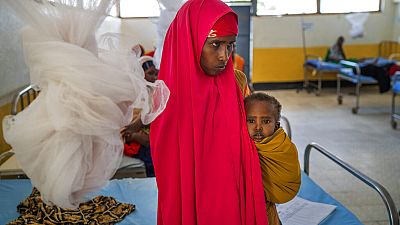

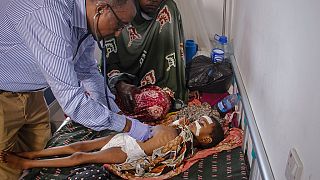
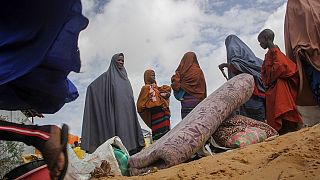
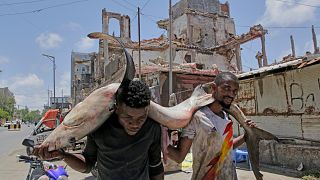
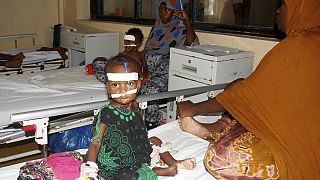
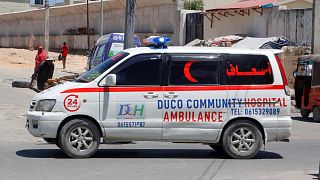



Go to video
In Kenya, 90% of packaged food needs health warning label under new rules
00:52
Nigeria’s Peter Obi to contest 2027 election, opposition coalition in jeopardy
Go to video
Cameroon’s Tourism Minister joins presidential race as Biya’s silence fuels uncertainty
01:39
Driven to starvation, Sudanese eat weeds and plants to survive
Go to video
INTERPOL seizes $65M in fake drugs, arrests 769 in largest-ever global crackdown
Go to video
Uganda's Museveni breaks African silence on Israel-Iran war